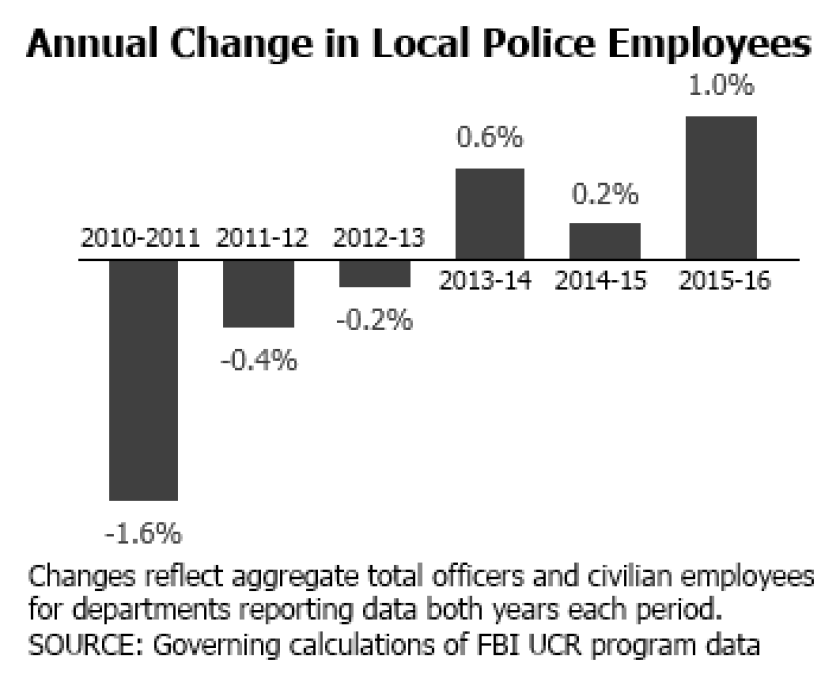The additional manpower has meant more resources for traffic enforcement, counterterrorism work and training. It has also allowed for the creation of the department’s first dedicated officer recruiting unit.
Many local police departments across the country have also been staffing up for the first time in several years, according to the latest FBI statistics. Among big-city departments, Detroit, Newark, N.J., and Philadelphia all experienced particularly large increases in total personnel between 2015 and 2016. Of larger departments with at least 500 personnel, the top 10 reported year-over-year increases between 6 and 37 percent.
Like other areas of government, many police departments incurred cutbacks during and immediately following the recession. And some are still feeling the downturn's effects, which has impeded hiring efforts at these departments. In addition to lingering tight budgets, departments are also facing accelerating retirements or recruiting shortages.
Police departments recorded an aggregate uptick in personnel of 1 percent when staffing totals for all agencies reporting data to the FBI in both 2015 and 2016 are compared. While that’s not much, it does represent a slight increase from recent years.

Darrel Stephens, who recently retired as director of the Major Cities Chiefs Police Association, says recovering finances is likely one reason.
"It probably has more to do with growth in cities than anything," he says. Cities experiencing spikes in crime may have allocated additional funds for police as well.
Where additional hiring has occurred, many of the new employees are likely filling civilian positions cut during the recession. The Census Bureau’s annual survey of employment and payroll suggests non-sworn police employees were among the hardest hit of any area of local government. Often, the cuts forced departments to pull officers from patrols to take over these administrative duties.
“It’s sort of a shell game in some of these cities because they can’t cut sworn people,” Stephens says. “It has an impact on officers on the street.”
The Detroit Police Department reported hiring about 200 civilians to free up officers to return to patrol positions last year. Civilian jobs are easier for cities to fill since they usually come with lower salaries compared to officers.
It was the big-city departments with the largest budgets that generally added the most officers last year. Those serving jurisdictions with more than 200,000 residents grew by 1.3 percent, more than double the rate of the smallest departments.
| Jurisdiction Population | 2015-16 Change | Employee Increase | Number of Jurisdictions |
|---|---|---|---|
| Less than 25,000 | 0.6% | 632 | 6683 |
| 25,000 - 100,000 | 0.8% | 868 | 1129 |
| 100,000 - 200,000 | 0.5% | 247 | 163 |
| More than 200,000 | 1.3% | 2578 | 102 |
Some departments' hiring hasn't been limited by a lack of funding, but by an inability to recruit candidates fast enough. That's because departments are seeing large numbers of retiring baby boomers.
Veteran officers and potential recruits may also be looking for opportunities in the now-healthy private sector. This is particularly true of jurisdictions where benefits were cut or where pay freezes persisted. Officials in San Diego, for instance, are nearing an agreement for a new contract with the police union that would provide pay raises up to 30 percent, in part to address the department’s retention woes.
And some departments are reporting that negative public perceptions of police has made it difficult to attract candidates.
A litany of negative consequences might result from inadequately staffed departments. Jersey City Public Safety Director James Shea says that not only are response times affected, but community relations suffer as officers are always running to calls.
“Just about everything suffers if you don’t have enough people,” he says.
One way departments have both expanded and broadened their pools of applicants is by revising job qualification requirements. Jersey City allows applicants with some decades-old minor criminal offenses to remain eligible for employment, while other departments have eased college credit-hour requirements or updated entrance exams.
The Jersey City Police Department has sought to make its force more diverse by focusing on working within communities and opening a recruitment office in one of the city’s black neighborhoods.
“You can’t just show up and ask people to give you their sons and daughters,” Shea says.








